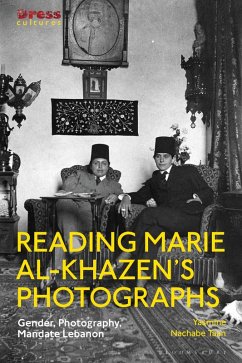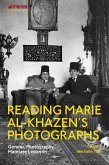The Lebanese photographer Marie al-Khazen seized every opportunity to use her camera during the years that she was active between 1920 and 1940. She not only documented her travels around tourist sites in Lebanon but also sought creative experimentation with her camera by staging scenes, manipulating shadows, and superimposing negatives to produce different effects in her prints. Within her photographs, bedouins and European friends, peasants and landlords, men and women comfortably share the same space. Her photographs include an intriguing collection portraying her family and friends living their everyday lives in 1920s and '30s Zgharta, a village in the north of Lebanon.
Yasmine Nachabe Taan explores these photographs, emphasizing the ways in which notions of gender and class are inscribed within them and revealing how they are charged with symbols of women's emancipation to today's viewers, through women's presence as individuals, separate from family restrictions of that time. Images in which women are depicted smoking cigarettes, driving cars, riding horses, and accompanying men on hunting trips counteract the common ways in which women were portrayed in contemporary Lebanon.
Yasmine Nachabe Taan explores these photographs, emphasizing the ways in which notions of gender and class are inscribed within them and revealing how they are charged with symbols of women's emancipation to today's viewers, through women's presence as individuals, separate from family restrictions of that time. Images in which women are depicted smoking cigarettes, driving cars, riding horses, and accompanying men on hunting trips counteract the common ways in which women were portrayed in contemporary Lebanon.









